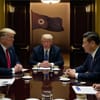As the world grapples with increasingly complex global challenges, leaders from the United States, China, and North Korea are sitting down to discuss some of the most pressing issues shaping international relations today. From the rapidly advancing field of artificial intelligence (AI) to the growing concerns over North Korea’s nuclear ambitions, the discussions have far-reaching implications. The latest talks between President Joe Biden, former President Donald Trump, and Chinese President Xi Jinping have highlighted these critical topics, which are increasingly dominating diplomatic agendas across the globe.
In a series of high-stakes meetings, the leaders of these nations have raised concerns over the geopolitical impact of AI, particularly in the context of national security and economic competitiveness. While AI offers enormous potential for innovation, it also poses new risks that could reshape global power dynamics. The technology’s role in military strategy, cybersecurity, and intelligence gathering has become a central point of discussion. For example, AI-driven systems could be used to enhance weapons technology, automate cyber-attacks, or even influence political outcomes. As a result, these leaders are looking at how AI can be controlled or regulated to avoid an arms race in this new technological frontier.
At the same time, North Korea remains a critical focus of attention. The isolated regime's pursuit of nuclear weapons and ballistic missile technology continues to challenge global peace and stability. Leaders are particularly concerned about Pyongyang’s efforts to develop advanced military systems, some of which may leverage AI or other emerging technologies. The prospect of AI being used to enhance North Korea’s military capabilities has raised alarms, prompting the U.S., China, and other regional powers to work together to address the potential risks.
The dynamics surrounding North Korea are further complicated by the diplomatic tension between the U.S. and China. While both countries share concerns over Pyongyang’s nuclear program, their approaches diverge on how to handle the situation. The U.S. has long advocated for stricter sanctions and pressure on North Korea, while China, North Korea’s most significant ally, has called for dialogue and a more measured response. The delicate balance between enforcing sanctions and engaging in diplomacy is a topic of contention, and finding a path forward is one of the most difficult diplomatic challenges facing these leaders.
Amid all this, the global race for AI supremacy is unfolding, and its potential to shift economic and strategic power is a major concern for the U.S. and China. President Biden has emphasized the need for the U.S. to lead in AI development to maintain its global edge. On the other hand, President Xi has made it clear that China is investing heavily in AI and other cutting-edge technologies, signaling its intent to challenge American dominance in tech. The discussions have underscored how crucial AI is to both national security and economic leadership in the 21st century.
As the world navigates these intertwined challenges—AI, North Korea’s nuclear ambitions, and the shifting balance of power—these high-level talks are critical in shaping future global policies. The stakes are incredibly high, and the actions of these leaders could have a lasting impact on international security, technological development, and economic relations for years to come.


